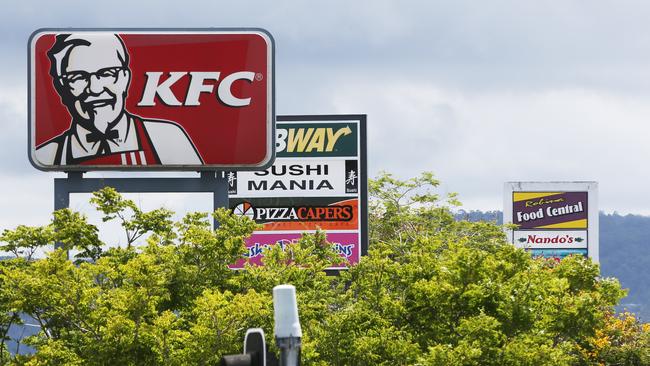Billboards to tear down all junk food ads
The Queensland government, in a bid to curb childhood obesity, will ban ads for sugary, fatty or salty foods from its billboards.

More than 2000 Queensland government billboards and advertising spaces will become junk food-free zones under a plan to address childhood obesity.
Health Minister Steven Miles yesterday announced the ban on advertising food with unhealthy levels of sugar, fat and/or salt, at sites such as bus shelters, railway stations and roadsides.
He said the advertising ban would help the government achieve its target of increasing by 10 per cent the number of people with a healthy weight by 2026.
The move was welcomed by Diabetes Queensland program director Lyn Hamill, who said about 80 per cent of Queenslanders were overweight.
“The removal of access to advertising will help Queenslanders make more healthy decisions about what they eat,” Ms Hamill said. “We’d love to see people eating more fruit and vegetables.”
Mr Miles could not say how much the ban might end up costing, admitting advertising on government-owned sites generated millions of dollars in revenue.
“This won’t all be lost revenue because some of that advertising space will be taken up by other advertisers, hopefully advertising healthier food choices,” he said.
Fast food ads would continue to be allowed at sports stadiums such as the Gabba because of more complex contractual arrangements, Mr Miles said.
But Liberal National Deputy Opposition Leader Tim Mander said the ban raised questions.
“Does that mean KFC can no longer support the Big Bash? That Coca-Cola can no longer support the Queensland Firebirds?” Mr Mander said. “We think the government should be focusing on hospital beds, not billboards.”
Australian Food and Grocery Council spokesman James Mathews said they had not been consulted about the ad ban.
“The very nature of outdoor advertising is it’s targeting the majority of consumers who are adults, who can exercise their choice through consumer power,” Mr Mathews said.
“We would also point out 53,000 people work in the Queensland food and groceries sector and codes are in place to restrict promotion of high salt, fat and sugar products to children.”
Institute of Public Affairs executive director John Roskam said the ban appeared to be a “thought bubble” by the Queensland government given the lack of consultation or clear parameters.
“It’s incredible to think there’s no bigger priority for government than this, and it does nothing to encourage people to take responsibility for their own lives,” Mr Roskam said.



To join the conversation, please log in. Don't have an account? Register
Join the conversation, you are commenting as Logout